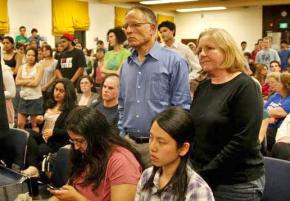Double standards at Berkeley
On April 18, the University of California (UC) Berkeley Student Senate voted 11-9 for a bill that calls for divestment from Israeli apartheid, making it the fourth UC student government to do so this academic year. The vote took place after a 10-hour session that lasted through the night in a campus hall overflowing with hundreds of students. The bill enjoyed broad support among campus student groups.
But it only took UC Berkeley Chancellor Robert Birgeneau a few hours to repudiate the vote in a statement. In response, Palestine solidarity activist wrote the following piece published in the Daily Californian.
WHAT DOES the marginalization of a large and diverse coalition of students look like?
It looks something like Chancellor Robert Birgeneau's statement that was recently released in response to SB 160, the Associated Students of the University of California (ASUC) bill that calls for targeted divestment from companies complicit in Israeli apartheid and illegal settlement.
Birgeneau explained his opposition to SB 160 just hours after the student senate passed the bill but waited over two weeks to condemn an April 1 assault on a Students for Justice in Palestine (SJP) member.
The SJP member was publicly attacked in Sproul Plaza for vocally affirming Israel's status as an apartheid state--a description which notable figures like Archbishop Desmond Tutu, award-winning author Alice Walker, former President Jimmy Carter and former Israeli attorney general Michael Ben-Yair agree with.
When the chancellor is quick to condemn a decision by the student senate majority but drags his feet before condemning an assault on a SJP member, it should be obvious which group is being marginalized.

Moreover, the chancellor downplays the severity of the assault by writing in his statement that the SJP member was "struck in the face." In reality, the SJP member was punched in the face with a closed fist and knocked to the ground by a much larger assailant. The blow was so forceful that a witness reported shortly after the assault that the assailant's knuckles were bleeding.
BIRGENEAU'S STATEMENT was insensitive, and it employed victim-blaming rhetoric. He argued that it was the divestment campaign that caused a divisive, hostile climate on campus. Nothing could be further from the truth. Divestment is in actuality an effective, nonviolent and legitimate tactic in the struggle against Israeli apartheid.
The chancellor argued that the campus is divided, but who stands on which side?
Thirty-one student organizations endorsed targeted divestment from Israeli apartheid, but Birgeneau sided with a small number of pro-Zionist students. It should be clear that the major division is not within the student body but between students and the administration.
To continue employing rhetoric that builds on a narrative of conflict between "students of color" and "Jewish students" is to disregard developing bonds of solidarity between Palestinian students and diverse networks of allies, including Jewish and Israeli students who supported SB 160.
Even Noah Kulwin, an opponent of SB 160, stated in a Daily Californian opinion blog that Palestine solidarity activists are constantly "demonized," "delegitimized" and held to an unfair "double standard." When Palestine activists face hostility, their victimhood is often removed from them, and they are blamed for their own victimization.
Merely holding a political opinion is perceived as hostile, and violent reactions to such a "hostile" political opinion are seen as a natural reaction--as if saying violent response to Palestine solidarity activism is only to be expected. As if saying divestment is to blame for violent reactions--not the perpetrators of such violence. Such is the underlying rhetoric being employed in the aftermath of the inexcusable assault on a member of SJP.
UC Berkeley has a rich history of activism--from the Free Speech Movement to the Third World Liberation Front to the divestment campaigns against South African apartheid--that we should ultimately be proud of. What many of us take for granted today--free speech, ethnic studies and the end of South African apartheid--were once deemed "controversial," publicly demonized and met with repression from authorities.
Whereas the campus administration has repeatedly attempted to suppress students' activism and democracy, students and community members have nonetheless persisted in connecting many struggles in our own community to the struggle for justice in Palestine. There is a clear connection between American imperialism allied with Israel in the Middle East and the austerity, racism, militarization and violence here in the United States.
We say no to Israeli apartheid and illegal settlements. We say no to victim-blaming and the scapegoating of divestment. We demand recognition and reversal of these policies, and we stand as students united in solidarity for justice in Palestine--and for justice at our school.


